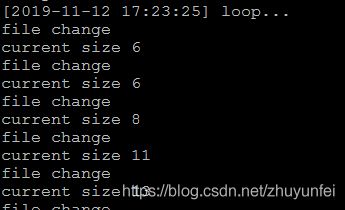- 传统金融和分布式金融
倒霉男孩
DeFi金融分布式
文章目录传统金融和分布式金融一、传统金融机构的核心问题深度剖析1.支付与清算系统的结构性缺陷2.金融排斥(FinancialExclusion)的根源3.中心化风险的爆发与传导二、DeFi的技术突破与创新机制1.支付与清算:区块链的底层重构2.普惠金融的技术民主化3.去中心化治理与透明化运作三、DeFivs传统金融的范式革命1.价值传递范式的颠覆2.风险分散机制的升级3.经济模型的创新实验四、De
- Bilve 搭建手册
波格斯特
eureka云原生
从零搭建Bilive需要提前安装dockerbilive第一步dockerclitodockercompose#https://www.mklab.cn/utils/dockersudodockerrun\-itd\--namebilive_docker\-p22333:2233\ghcr.io/timerring/bilive:0.2.10version:'3.1'services:bilive
- Scrum实施情况调查之案例分析
zhijie435
项目管理thoughtworks敏捷项目管理敏捷开发工作框架
导读:社区Agile主题敏捷实施,企业级敏捷标签Scrum作者李剑,在InfoQ中文站上发表了一篇"Scrum在中国——企业实施情况调查实录"。这份调查实录,分别调查了五个实施SCRUM的公司,其中三家公司实施成功,二家公司失败。我建议所有准备或者正在实施SCRUM的人们都能来读一下。在此,我们会对这篇文章中的案例分类进行分析、诊断。并探讨什么是敏捷开发方法、什么是SCRUM、使用敏捷方法需要什么
- Flink命令行启动Job任务
平凡的运维之路
linux程序人生
Flink非交互式运行Job任务Flink命令行启动Job任务具体命令flink参数说明-c,--class-d,--detached后台运行-p,--parallelism并行度[test@xxx~]$flinkrun-d-cclass_nameJob-p3./flink-statics-1.0.jar-zookeeper"10.130.41.51:2181,10.130.41.52:2181,
- Centos7软件包管理(rpm、yum)
Bulut0907
Linuxcentos软件包管理rpmyumyum源修改
目录1.rpm2.yum2.1修改yum源1.rpmRPM(RedHatPackageManager),redhat系列操作系统里面的打包安装工具查询命令:查询安装的所有rpm软件包:rpm-qa查询指定rpm软件包,并显示详细信息:rpm-qipython3卸载命令:卸载软件包,不管是否有其它软件包依赖该软件包:rpm-e--nodeps软件包名称安装命令:安装rpm包,并显示详细信息和进度条(
- Qt 自定义标题栏——QtWidgets
十年之少
QtWidgetsQt自定义标题栏
1.去掉标题栏,实现窗体拖动(常用)以上转载方法实现窗体拖动是通过Windows事件的;但是有时候为了跨平台这种的话就得重写,比较麻烦,所以还是采用最原始的方法:通过QWidgets的鼠标事件来实现。.h文件classQRCodeDialog:publicQDialog{Q_OBJECT...protected:voidmouseMoveEvent(QMouseEvent*event)overri
- rust学习笔记16-206.反转链表(递归)
水蜜桃one
学习笔记链表
rust函数递归在14中已经提到,接下来我们把206.反转链表,用递归法实现递归函数通常包含两个主要部分:基准条件(BaseCase):递归终止的条件,避免无限递归。递归步骤(RecursiveStep):将问题分解为更小的子问题,并调用自身来解决这些子问题。//Definitionforsingly-linkedlist.#[derive(PartialEq,Eq,Clone,Debug)]pu
- 数据让农业更聪明——用大数据激活田间地头
Echo_Wish
大数据大数据
数据让农业更聪明——用大数据激活田间地头在农业领域,随着人口增长和气候变化的影响,如何提升生产力始终是个关键话题。大数据,这个曾经只属于科技领域的概念,如今已悄然进入田间地头。今天,我以Echo_Wish的视角,和大家聊聊大数据如何赋能农业生产力,帮农民在阳光下也能掌握“科技的钥匙”。认识农业中的大数据什么是农业中的“大数据”?简单来说,就是收集和分析有关土地、气候、作物、病虫害以及市场需求等方面
- yum install locate出现Error: Unable to find match: locate解决方案
爱编程的喵喵
Linux解决方案linuxlocateyum解决方案
大家好,我是爱编程的喵喵。双985硕士毕业,现担任全栈工程师一职,热衷于将数据思维应用到工作与生活中。从事机器学习以及相关的前后端开发工作。曾在阿里云、科大讯飞、CCF等比赛获得多次Top名次。现为CSDN博客专家、人工智能领域优质创作者。喜欢通过博客创作的方式对所学的知识进行总结与归纳,不仅形成深入且独到的理解,而且能够帮助新手快速入门。 本文主要介绍了yuminstalllocate出现
- 【CXX-Qt】2.1 构建系统
Source.Liu
CXX-Qtqtrustc++
CXX-Qt可以集成到现有的CMake项目中,也可以仅使用Cargo进行构建。需要了解的可以阅读上2篇文章:Cargo集成CMake集成CXX-Qt可以与任何C++构建系统一起使用,只要在调用Cargo之前设置了QMAKE、CXX_QT_EXPORT_DIR和CXX_QT_EXPORT_CRATE_环境变量。请查看我们的CMake代码以了解如何使用这些变量。然而,除了Cargo或CMake之外,使
- 优化Apache Spark性能之JVM参数配置指南
weixin_30777913
jvmspark大数据开发语言性能优化
ApacheSpark运行在JVM之上,JVM的垃圾回收(GC)、内存管理以及堆外内存使用情况,会直接对Spark任务的执行效率产生影响。因此,合理配置JVM参数是优化Spark性能的关键步骤,以下将详细介绍优化策略和配置建议。通过以下优化方法,可以显著减少GC停顿时间、提升内存利用率,进而提高Spark作业吞吐量和数据处理效率。同时,要根据具体的工作负载和集群配置进行调整,并定期监控Spark应
- GraphCube、Spark和深度学习技术赋能快消行业关键运营环节
weixin_30777913
开发语言大数据深度学习人工智能spark
在快消品(FMCG)行业,需求计划(DemandPlanning)、库存管理(InventoryManagement)和需求供应管理(DemandSupplyManagement)是影响企业整体效率和利润水平的关键运营环节。GraphCube图多维数据集技术、Spark大数据分析处理技术和深度学习技术的结合,为这些环节提供了智能化、动态化和实时化的解决方案,显著提升业务运营效率和企业利润。一、技术
- 快速启动flink项目
for your wish
flinkjava大数据
按照这个步骤1分钟内创建完成idea-----File----new---Project------Maven----Createfromarchetype----AddArchetype弹出框:GroupId填org.apache.flinkArtifactId填flink-quickstart-javaVersion填1.14.0选中刚刚添加的Archetype,点Next填写你要创建的这个f
- 中高级开发必看!MySQL 面试秘籍助你飞升
七七知享
数据库mysql面试数据库程序人生职场和发展学习方法github
中高级开发必看!MySQL面试秘籍助你飞升想要晋升中高级开发岗位?MySQL面试攻略来助力!这篇CSDN文章堪称你进阶路上的“秘密武器”,从基础概念到高阶优化,全方位覆盖MySQL面试要点,无论是索引原理、查询优化,还是事务处理、主从复制,都有深入解读,助你轻松应对面试官的各类难题,稳稳拿下心仪Offer,向着中高级开发岗位大步迈进!
- leetcode刷题日记——轮转数组
许_安
刷题日记leetcode算法排序算法
[题目描述]:[思路]:题目要求将一个整数数组向右轮转k个位置,右边超出的数,从左边插入因为是向右轮转k个位置,所以可以直接遍历数组,将其存放位置index加上k,但index+k可能会超出数组长度,即需要轮转到数组前面。由于数组元素个数为numsSize,也就是数组长度,我们可以通过(index+k)%numsSize取余来确定超出元素的位置运行如下voidrotate(int*nums,int
- STM32寄存器编码流程总结(上部)
物联网菜鸟
基础知识学习stm32单片机嵌入式硬件
目录一、GPIO二、中断系统三、USART串口通信四、I2C通讯五、高级定时器六、DMA存储访问七、ADC数模转换八、API通信九、FSMC控制器十、LCD显示一、GPIO1.时钟的配置//开启引脚的时钟RCC->APB2ENR|=RCC_APB2ENR_IOPAEN;2.设置GPIO的工作模式//PA0的工作模式为通用推挽输出模式//CNF选择输入或输出的不同模式GPIOA->CRL&=~GPI
- rust Send Sync 以及对象安全和对象不安全
叠叠乐
rust
开头:菜鸟小明的疑惑小明:“李哥,我最近学Rust,感觉它超级严谨,啥Send、Sync、对象安全、静态分发、动态分发的,我都搞晕了!为啥Rust要设计得这么复杂啊?”小李(笑):“别急,Rust是因为想让代码‘安全’,又‘高性能’,所以才有这么多机制。我们从头讲,慢慢来,一定搞清楚。”---第一章:线程安全是怎么做到的?Send/Sync---Send是啥?小明:“我知道线程是并发执行的,但Ru
- taosdump备份多个数据库近10天的数据
会飞的土拨鼠呀
运维学习笔记数据库oracle
以下是使用taosdump备份多个指定数据库近10天数据的详细步骤:方法1:直接指定多个数据库名称通过--databases参数直接指定多个数据库,逗号分隔:#!/bin/bash#定义备份目录和时间范围BACKUP_DIR="./backup"START_TIME=$(date-d"10daysago""+%Y-%m-%d%H:%M:%S")END_TIME=$(date"+%Y-%m-%d%H
- 第三十篇 维度建模:从理论到落地的企业级实践
随缘而动,随遇而安
数据库sql数据仓库大数据数据库架构
目录一、维度建模核心理论体系1.1Kimball方法论四大支柱1.2关键概念对比矩阵二、四步建模法全流程解析2.1选择业务过程(以电商为例)2.2声明原子粒度(订单案例)2.3维度设计规范时间维度(含财年逻辑)SCDType2完整实现(Hudi)2.4事实表类型与设计三、企业级建模实战:电商用户分析3.1业务矩阵分析3.2模型实现代码四、高级建模技巧4.1多星型模式关联4.2大数据场景优化五、性能
- const关键字的作用和用法
C++ 老炮儿的技术栈
开发语言c++笔记学习
在C++中,const关键字有以下作用和用法:修饰变量-表示该变量的值不能被修改,在定义时必须初始化。例如:constintnum=10;,之后任何试图修改num值的操作都会导致编译错误。-可以提高程序的可读性和可维护性,让代码的读者清楚哪些变量是不应该被修改的。修饰指针-可以修饰指针本身或指针所指向的内容。例如,constint*ptr;表示指针所指向的int值是常量,不能通过ptr来修改该值,
- 【人工智能机器学习基础篇】——深入详解无监督学习之降维:PCA与t-SNE的关键概念与核心原理
猿享天开
人工智能数学基础专讲人工智能机器学习无监督学习降维
深入详解无监督学习之降维:PCA与t-SNE的关键概念与核心原理在当今数据驱动的世界中,数据维度的增多带来了计算复杂性和存储挑战,同时也可能导致模型性能下降,这一现象被称为“维度诅咒”(CurseofDimensionality)。降维作为一种重要的特征提取和数据预处理技术,旨在通过减少数据的维度,保留其主要信息,从而简化数据处理过程,并提升模型的性能。本文将深入探讨两种广泛应用于无监督学习中的降
- yum彻底卸载软件包(包含依赖)
mighty13
Linuxcentos卸载yum依赖history
概述yum命令安装软件包时会自动依赖包,但yumremove子命令只卸载该软件包而不能卸载依赖。如果需要删除安装时自动安装的依赖包,则可以使用yumhistory子命令回滚安装事务以达到目的。具体操作查看yum操作(事务)历史[root@localhost~]#yumhistorylist或yumhistoryLoading"fastestmirror"pluginConfigtime:0.007
- 【MyDB】6-TabelManager 字段与表管理 之2-SQL语句解析
-$_$-
Java项目sqlpython数据库
【MyDB】6-TabelManager字段与表管理之2-SQL语句解析前言SQL语法Parser类具体实现入口方法Parse(byte[]statement)事务控制parseBegin()parseCommit(),parseAbortDDL(DataDefinitionLanguage)parseCreate()parseDrop()DML语句parseSelect()parseInsert
- Hive面试题
御风行云天
面试题大全hivehadoop数据仓库面试
Hive面试题1Hive基础概念1.1解释Hive是什么以及它的用途Hive的主要用途:1.2描述Hive架构和组件1.HiveCLI/Beeline和WebUI2.HiveQL3.HiveDriver(驱动)4.Metastore5.Compiler(编译器)6.Optimizer(优化器)7.Executor(执行器)8.HadoopCoreComponents(核心组件)9.HiveUDFs
- 3.1css选择器优先级和常用文本属性
chxii
go语言#前端css前端
在CSS(层叠样式表)中,选择器的优先级决定了当多个选择器应用于同一个元素时,哪个样式的规则会被应用。选择器的优先级是通过特定的规则来计算的,这些规则决定了样式声明的权重。以下是CSS选择器优先级的基本规则:重要性(!important)如果某个样式声明使用了!important,那么它将覆盖没有使用!important的任何规则。例如:p{color:red!important;}在这种情况下,
- SpringBoot可以同时处理多少请求?
java1234_小锋
javajava开发语言
大家好,我是锋哥。今天分享关于【SpringBoot可以同时处理多少请求?】面试题。希望对大家有帮助;SpringBoot可以同时处理多少请求?1000道互联网大厂Java工程师精选面试题-Java资源分享网SpringBoot本身并不直接限制可以处理的请求数量,能处理多少请求取决于几个因素,主要是底层的Web服务器(如嵌入式的Tomcat、Jetty或Undertow),以及服务器硬件、操作系统
- java常用数据转换
bestwinner
javapythonwindows
1.List与数组互转ArrayListlist=newArrayListlist1=Arrays.stream(array1).collect(Collectors.toList());String[]cateArray=cateList.toArray(newString[cateList.size()]);2.new集合对像importcom.google.common.collect.Li
- 编程语言选择分析:C#、Rust、Go 与 TypeScript 编译器优化
互联网搬砖老肖
工具使用原力计划c#rustgolang
编程语言选择分析:C#、Rust、Go与TypeScript编译器优化在讨论编程语言的选择时,特别是针对微软的C#和Rust,以及谷歌的Go语言,以及微软试图通过Go来拯救TypeScript编译器的问题,我们可以从多个角度来分析和理解。首先,我们来逐一分析这些语言的特点和它们各自的应用场景。1.C#C#是微软开发的一种面向对象的编程语言,它是.NET框架的核心部分。C#广泛用于Windows应用
- 解决Ubuntu报错 E: Unable to locate package yum
SH-ke
ubuntuyumapt
开门见山,Ubuntu的包管理工具是apt-get,所以不必再安装yum。如果要安装其他包需要使用apt-get命令。#这里以locate命令为例sudoapt-getinstallmlocate下文就是问题解决的全过程了。1.报错E:Unabletolocatepackageyum我在学习Linux命令的时候需要使用locate命令,但是Ubuntu的系统里没有安装locate命令。根据弹幕的指
- 开发实战|commons-lang3库的字符串工具类join方法
六月暴雪飞梨花
commons-lang3StringUtilsStringjoin
作者简介:「六月暴雪飞梨花」,专注于研究Java,就职于科技型公司后端工程师近期荣誉:华为云云享专家、阿里云专家博主、腾讯云优秀创作者、腾讯云TDP-KOL、ACDU成员、墨天轮技术专家博主三连支持:欢迎❤️关注、点赞、收藏三连,支持一下博主~文章目录引言来源StringUtils.joinString.join功能对比StringUtils.join支持原生数组支持集合支持迭代器Iterator
- 关于旗正规则引擎规则中的上传和下载问题
何必如此
文件下载压缩jsp文件上传
文件的上传下载都是数据流的输入输出,大致流程都是一样的。
一、文件打包下载
1.文件写入压缩包
string mainPath="D:\upload\"; 下载路径
string tmpfileName=jar.zip; &n
- 【Spark九十九】Spark Streaming的batch interval时间内的数据流转源码分析
bit1129
Stream
以如下代码为例(SocketInputDStream):
Spark Streaming从Socket读取数据的代码是在SocketReceiver的receive方法中,撇开异常情况不谈(Receiver有重连机制,restart方法,默认情况下在Receiver挂了之后,间隔两秒钟重新建立Socket连接),读取到的数据通过调用store(textRead)方法进行存储。数据
- spark master web ui 端口8080被占用解决方法
daizj
8080端口占用sparkmaster web ui
spark master web ui 默认端口为8080,当系统有其它程序也在使用该接口时,启动master时也不会报错,spark自己会改用其它端口,自动端口号加1,但为了可以控制到指定的端口,我们可以自行设置,修改方法:
1、cd SPARK_HOME/sbin
2、vi start-master.sh
3、定位到下面部分
- oracle_执行计划_谓词信息和数据获取
周凡杨
oracle执行计划
oracle_执行计划_谓词信息和数据获取(上)
一:简要说明
在查看执行计划的信息中,经常会看到两个谓词filter和access,它们的区别是什么,理解了这两个词对我们解读Oracle的执行计划信息会有所帮助。
简单说,执行计划如果显示是access,就表示这个谓词条件的值将会影响数据的访问路径(表还是索引),而filter表示谓词条件的值并不会影响数据访问路径,只起到
- spring中datasource配置
g21121
dataSource
datasource配置有很多种,我介绍的一种是采用c3p0的,它的百科地址是:
http://baike.baidu.com/view/920062.htm
<!-- spring加载资源文件 -->
<bean name="propertiesConfig"
class="org.springframework.b
- web报表工具FineReport使用中遇到的常见报错及解决办法(三)
老A不折腾
finereportFAQ报表软件
这里写点抛砖引玉,希望大家能把自己整理的问题及解决方法晾出来,Mark一下,利人利己。
出现问题先搜一下文档上有没有,再看看度娘有没有,再看看论坛有没有。有报错要看日志。下面简单罗列下常见的问题,大多文档上都有提到的。
1、repeated column width is largerthan paper width:
这个看这段话应该是很好理解的。比如做的模板页面宽度只能放
- mysql 用户管理
墙头上一根草
linuxmysqluser
1.新建用户 //登录MYSQL@>mysql -u root -p@>密码//创建用户mysql> insert into mysql.user(Host,User,Password) values(‘localhost’,'jeecn’,password(‘jeecn’));//刷新系统权限表mysql>flush privileges;这样就创建了一个名为:
- 关于使用Spring导致c3p0数据库死锁问题
aijuans
springSpring 入门Spring 实例Spring3Spring 教程
这个问题我实在是为整个 springsource 的员工蒙羞
如果大家使用 spring 控制事务,使用 Open Session In View 模式,
com.mchange.v2.resourcepool.TimeoutException: A client timed out while waiting to acquire a resource from com.mchange.
- 百度词库联想
annan211
百度
<!DOCTYPE html>
<html>
<head>
<meta http-equiv="Content-Type" content="text/html; charset=UTF-8">
<title>RunJS</title&g
- int数据与byte之间的相互转换实现代码
百合不是茶
位移int转bytebyte转int基本数据类型的实现
在BMP文件和文件压缩时需要用到的int与byte转换,现将理解的贴出来;
主要是要理解;位移等概念 http://baihe747.iteye.com/blog/2078029
int转byte;
byte转int;
/**
* 字节转成int,int转成字节
* @author Administrator
*
- 简单模拟实现数据库连接池
bijian1013
javathreadjava多线程简单模拟实现数据库连接池
简单模拟实现数据库连接池
实例1:
package com.bijian.thread;
public class DB {
//private static final int MAX_COUNT = 10;
private static final DB instance = new DB();
private int count = 0;
private i
- 一种基于Weblogic容器的鉴权设计
bijian1013
javaweblogic
服务器对请求的鉴权可以在请求头中加Authorization之类的key,将用户名、密码保存到此key对应的value中,当然对于用户名、密码这种高机密的信息,应该对其进行加砂加密等,最简单的方法如下:
String vuser_id = "weblogic";
String vuse
- 【RPC框架Hessian二】Hessian 对象序列化和反序列化
bit1129
hessian
任何一个对象从一个JVM传输到另一个JVM,都要经过序列化为二进制数据(或者字符串等其他格式,比如JSON),然后在反序列化为Java对象,这最后都是通过二进制的数据在不同的JVM之间传输(一般是通过Socket和二进制的数据传输),本文定义一个比较符合工作中。
1. 定义三个POJO
Person类
package com.tom.hes
- 【Hadoop十四】Hadoop提供的脚本的功能
bit1129
hadoop
1. hadoop-daemon.sh
1.1 启动HDFS
./hadoop-daemon.sh start namenode
./hadoop-daemon.sh start datanode
通过这种逐步启动的方式,比start-all.sh方式少了一个SecondaryNameNode进程,这不影响Hadoop的使用,其实在 Hadoop2.0中,SecondaryNa
- 中国互联网走在“灰度”上
ronin47
管理 灰度
中国互联网走在“灰度”上(转)
文/孕峰
第一次听说灰度这个词,是任正非说新型管理者所需要的素质。第二次听说是来自马化腾。似乎其他人包括马云也用不同的语言说过类似的意思。
灰度这个词所包含的意义和视野是广远的。要理解这个词,可能同样要用“灰度”的心态。灰度的反面,是规规矩矩,清清楚楚,泾渭分明,严谨条理,是决不妥协,不转弯,认死理。黑白分明不是灰度,像彩虹那样
- java-51-输入一个矩阵,按照从外向里以顺时针的顺序依次打印出每一个数字。
bylijinnan
java
public class PrintMatrixClockwisely {
/**
* Q51.输入一个矩阵,按照从外向里以顺时针的顺序依次打印出每一个数字。
例如:如果输入如下矩阵:
1 2 3 4
5 6 7 8
9
- mongoDB 用户管理
开窍的石头
mongoDB用户管理
1:添加用户
第一次设置用户需要进入admin数据库下设置超级用户(use admin)
db.addUsr({user:'useName',pwd:'111111',roles:[readWrite,dbAdmin]});
第一个参数用户的名字
第二个参数
- [游戏与生活]玩暗黑破坏神3的一些问题
comsci
生活
暗黑破坏神3是有史以来最让人激动的游戏。。。。但是有几个问题需要我们注意
玩这个游戏的时间,每天不要超过一个小时,且每次玩游戏最好在白天
结束游戏之后,最好在太阳下面来晒一下身上的暗黑气息,让自己恢复人的生气
&nb
- java 二维数组如何存入数据库
cuiyadll
java
using System;
using System.Linq;
using System.Text;
using System.Windows.Forms;
using System.Xml;
using System.Xml.Serialization;
using System.IO;
namespace WindowsFormsApplication1
{
- 本地事务和全局事务Local Transaction and Global Transaction(JTA)
darrenzhu
javaspringlocalglobaltransaction
Configuring Spring and JTA without full Java EE
http://spring.io/blog/2011/08/15/configuring-spring-and-jta-without-full-java-ee/
Spring doc -Transaction Management
http://docs.spring.io/spri
- Linux命令之alias - 设置命令的别名,让 Linux 命令更简练
dcj3sjt126com
linuxalias
用途说明
设置命令的别名。在linux系统中如果命令太长又不符合用户的习惯,那么我们可以为它指定一个别名。虽然可以为命令建立“链接”解决长文件名的问 题,但对于带命令行参数的命令,链接就无能为力了。而指定别名则可以解决此类所有问题【1】。常用别名来简化ssh登录【见示例三】,使长命令变短,使常 用的长命令行变短,强制执行命令时询问等。
常用参数
格式:alias
格式:ali
- yii2 restful web服务[格式响应]
dcj3sjt126com
PHPyii2
响应格式
当处理一个 RESTful API 请求时, 一个应用程序通常需要如下步骤 来处理响应格式:
确定可能影响响应格式的各种因素, 例如媒介类型, 语言, 版本, 等等。 这个过程也被称为 content negotiation。
资源对象转换为数组, 如在 Resources 部分中所描述的。 通过 [[yii\rest\Serializer]]
- MongoDB索引调优(2)——[十]
eksliang
mongodbMongoDB索引优化
转载请出自出处:http://eksliang.iteye.com/blog/2178555 一、概述
上一篇文档中也说明了,MongoDB的索引几乎与关系型数据库的索引一模一样,优化关系型数据库的技巧通用适合MongoDB,所有这里只讲MongoDB需要注意的地方 二、索引内嵌文档
可以在嵌套文档的键上建立索引,方式与正常
- 当滑动到顶部和底部时,实现Item的分离效果的ListView
gundumw100
android
拉动ListView,Item之间的间距会变大,释放后恢复原样;
package cn.tangdada.tangbang.widget;
import android.annotation.TargetApi;
import android.content.Context;
import android.content.res.TypedArray;
import andr
- 程序员用HTML5制作的爱心树表白动画
ini
JavaScriptjqueryWebhtml5css
体验效果:http://keleyi.com/keleyi/phtml/html5/31.htmHTML代码如下:
<!DOCTYPE html>
<html xmlns="http://www.w3.org/1999/xhtml"><head><meta charset="UTF-8" >
<ti
- 预装windows 8 系统GPT模式的ThinkPad T440改装64位 windows 7旗舰版
kakajw
ThinkPad预装改装windows 7windows 8
该教程具有普遍参考性,特别适用于联想的机器,其他品牌机器的处理过程也大同小异。
该教程是个人多次尝试和总结的结果,实用性强,推荐给需要的人!
缘由
小弟最近入手笔记本ThinkPad T440,但是特别不能习惯笔记本出厂预装的Windows 8系统,而且厂商自作聪明地预装了一堆没用的应用软件,消耗不少的系统资源(本本的内存为4G,系统启动完成时,物理内存占用比
- Nginx学习笔记
mcj8089
nginx
一、安装nginx 1、在nginx官方网站下载一个包,下载地址是:
http://nginx.org/download/nginx-1.4.2.tar.gz
2、WinSCP(ftp上传工
- mongodb 聚合查询每天论坛链接点击次数
qiaolevip
每天进步一点点学习永无止境mongodb纵观千象
/* 18 */
{
"_id" : ObjectId("5596414cbe4d73a327e50274"),
"msgType" : "text",
"sendTime" : ISODate("2015-07-03T08:01:16.000Z"
- java术语(PO/POJO/VO/BO/DAO/DTO)
Luob.
DAOPOJODTOpoVO BO
PO(persistant object) 持久对象
在o/r 映射的时候出现的概念,如果没有o/r映射,就没有这个概念存在了.通常对应数据模型(数据库),本身还有部分业务逻辑的处理.可以看成是与数据库中的表相映射的java对象.最简单的PO就是对应数据库中某个表中的一条记录,多个记录可以用PO的集合.PO中应该不包含任何对数据库的操作.
VO(value object) 值对象
通
- 算法复杂度
Wuaner
Algorithm
Time Complexity & Big-O:
http://stackoverflow.com/questions/487258/plain-english-explanation-of-big-o
http://bigocheatsheet.com/
http://www.sitepoint.com/time-complexity-algorithms/
